Iftar dinner with the Ahmadi Muslim community of Monroe, WA displays unparalleled warmth, sincerity, and hospitality
Ahmadiyya Islam is a messianic, restorationist movement within Islam founded in 1889 by Muslim debator, theologian, and prolific writer Mirza Ghulam Ahmad in British India. The movement has since spread to almost every country on Earth with an estimated population of 10-20 million adherents. Ahmadi Muslims preach an incredibly intellectual, universal, and messianic view of Islam, which has lead in no small part to an Ahmadi scientist as the first Muslim to receive a Nobel Prize, Zoroaster, Buddha, and Krishna viewed as prophets, and, unfortunately, persecution in many parts of the world.
The movement has several fascinating theological differences from mainstream Islam, but at its core, Ahmadis believe their faith shows the essence of Islam.
On April 16, junior Xavier Nazzal travelled to the Ahmadiyya mosque in Monroe, WA for Iftar dinner, a celebration that takes place every evening at the end of the Ramadan fast during daylight hours.
Nazzal, junior Noah Wilson, junior Balin Kanno, and Nazzal’s friend from Curtis High School, Romeó Ibarra, drove, or more accurately, were driven by Nazzal’s parents, to the Ahmadiyya mosque in Monroe, WA, a massive structure with a vast parking lot (progressively filling with cars as the beginning of the event neared), a large playground on the peripheral of the property, a tremendous two-story gymnasium complete with a basketball court, a climbing wall, a balcony overlooking the courts, and a banner on the outside wall facing the street announcing “Love for All, Hatred for None.” Nazzal later learned that the gymnasium was a bonus that came with the land when purchased from a church community, who moved elsewhere in the state. The mosque itself contains glass doors and windows at the entrance leading to an incredibly long hall in which Iftar is celebrated. The prayer space is located to the right and both the hall and the prayer space are replicated on the left half of the building where the women pray and break the fast.
After arriving, Nazzal, Wilson, Kanno, and Ibarra entered the front doors, which were courteously held open by a young child, and were led to the prayer room. The prayer room is spacious with a lofty ceiling and a carpeted floor gently sloping down to the section where the prayer mats are located and finally a stage with a large screen for presentations. The prayer room is duplicated on the women’s side and everyone takes their shoes off when entering. The lights were also dimmed, which is a feature Nazzal found similar to that of a Greek Orthodox Church in Tacoma or 7 p.m. Mass at Saint Patrick’s in Tacoma.
The evening prayer was completed before the event began. Wilson, a Muslim, performed his first communal prayer since his conversion early last year. After the prayer finished and more people arrived, the event began with a Qur’an recitation, a presentation about the universality of fasting across all major religions, a presentation about the health benefits of fasting from a doctor in the community, and a Q&A session with the Imam.
After the Q&A session when everyone dispersed to prepare for a light breaking of the fast, Nazzal, Wilson, Kanno, and Ibarra talked with Mr. Waqas Malik, who was a guest for The GodCast and the World Religions Club, and Imam Azam Akram about recording an episode for The GodCast (which is currently scheduled for May 14), the Ahmadiyya Muslim community, and Islamic theology and history.
After conversing, the group left to eat dates and almonds, a light breaking of the fast, and ate with some of the members of the community. Afterwards, Nazzal, Wilson, Kanno, and Ibarra returned to the prayer room for the final prayer before sundown with Noah joining in to pray while Nazzal, Kanno, and Ibarra quietly reflected while sitting in the folding chairs near the exit.
After this, it was time to exit the prayer room again and reenter the prayer hall to eat incredible Pakistani cuisine. During this time, Nazzal interviewed the Ahmadi Muslims. To get some quick historical context, Nazzal asked media coordinator, Afaasiyab Ahmad for some historical context regarding Ramadan and Iftar dinner.
“I would say it is the month of fasting and the main philosophy behind it, the cornerstone, is to improve in your spirituality and your steadfastness,” said Ahmad. “We are supposed to do all the good deeds. There is like a huge emphasis on all these cornerstones of the Islamic way of life. Specifically abstaining from moral evils.”
“It was the month that the Quran was revealed and the month of fasting.” Taha Azam added, “Abstaining from the other haram stuff that will break your fast.”
“The concept of fasting existed before [Islam],” explained Ahmad, “The advent of Islam was when it really got started. The Holy Quran teaches you how to pray. The Holy Prophet says that you should fast. Ramadan is the name of the month.”
“The way of how Prophet Muhammad broke his fast was with dates and water,” Azam added regarding the origins of Iftar dinner.
After setting the context, Nazzal went around the dinner table, asking everyone what Ramadan means to them on a personal level.
“To me, Ramadan means the purifying of oneself to be a more morally-correct and more godly person, so you can be closer to God.” said Zohaib Lughmani, “To me, Ramadan means becoming a better person through abstaining from morally-wrong acts and fasting, and fasting purifies ourselves. And that’s why we have Ramadan to purify ourselves for the rest of the year.”
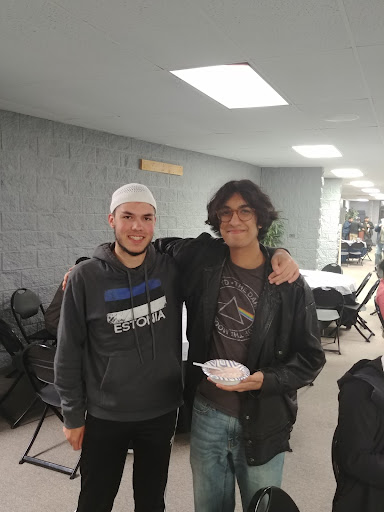
“For me, Ramadan is important, because obviously there is spirituality we talked about, but the other part as Zohaib mentioned is the festivity involved with it,” added Ahmad, “So, for example, I come from Pakistan, and in Pakistan it’s a really big deal. At the start of Ramadan, you would have these shops spring up on the street, specifically serving these snacks that you get at Ramadan. In Pakistan, people are really big on doing these kinds of donations, charity dinners would be the proper term, and that becomes a really big thing. During Ramadan, it becomes more evident that people pay money to help the needy in society. That’s also a really big thing in Ramadan. And then at the end of Ramadan, the big festivity that we celebrate together is the Eid. At the end of Ramadan, you’re supposed to see the moon. When the moon sighting happens, it means that the next month begins. That marks performing prayer in the morning and celebrating the festivities.”
Recollecting on his fondest memories of Ramadan, Ahmad said, “I came to the US in 2018. I came from the capital city of Pakistan, which is Islamabad. Right before Ramadan would end, around the 28th or the 29th of Ramadan, we would be really excited, because we would be going to our hometown. So during Eid, the big kind of excitement for me personally was to pack up my bag and be excited for that one-and-a-half hour journey to go see my grandparents, who would have this big feast prepared and the whole family would come there, the immediate family and also the extended family, and then we would go pray, we would do the prayer for the Eid, in the morning, and then we would come back and visit all the relatives in the entire village and then we would go out for some sightseeing or hiking or stuff like that, so those are the most fond memories for me.”
“Ramadan to me is the most exciting part of the year; something to really look forward to and that might sound weird, because it is a month of struggling,” described Osama Sobhi. “Everyone is still going to work, everyone is still going to school, we still have to study, you still have to do all your stuff, but it’s this added aspect of having less energy than you usually do. You have to control when you eat, but it’s all something to look forward to, because you can feel it in that month that spiritual atmosphere that’s created, that strengthens your relationship with God and opens the alleyway for you to take the steps towards God to get closer to him. That’s the most meaningful part to me to be able to take advantage of that and get closer to God and better yourself as a person and God gives us that opportunity even more so than he usually does throughout the rest of the year.”
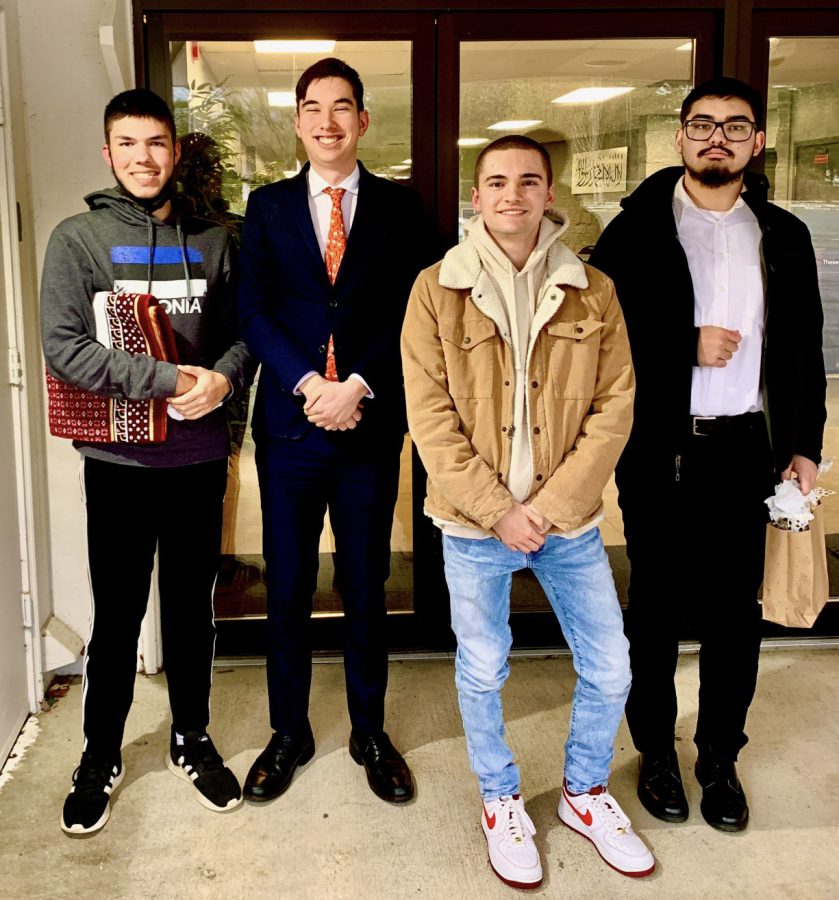
(Photo courtesy of Xavier Nazzal)
After sharing their experiences of Ramadan, Nazzal then asked everyone sitting at the table their views of Iftar dinner.
Mr. Waqas Malik shared a passage from the Hadiths, being the collection of the sayings of Muhammad, about fasting and the breaking of the fast. “[The Holy Prophet] said that for somebody who fasts, there are two happinesses. They’ll have joy two times. One is the moment that they break the fast, which is what we’re experiencing right now. I’m pretty happy right now, because we’re eating and drinking. And then the second one is when somebody will meet their Lord. So, the benefit of fasting is that you will experience these two joys. So, to me, that speaks to the two purposes of why we fast; the immediate benefit in this life and one in the next.”
Nazzal, Wilson, Kanno and Rylan Jordan, who was not able to attend, run a podcast and as a tradition, at the end of each episode, they ask what it means to be a follower of whatever religion is featured, so Nazzal asked this same question to everyone sitting at the table.
“Being an Ahmadi Muslim means to be in a community where we all worship God and where we all worship in the way of Allah and better ourselves for the greater good of humanity,” replied Lughmani.
“Being part of the Ahmadi Muslim community and being a Muslim in general means I worship one God and believe in all His messengers and Prophet Muhammad (sa), and follow the teachings of Islam, and our motto is ‘Love for All, Hatred for None,’ so it means a lot, and right now it’s the month of Ramadan, so that’s the month where all Muslims around the world fast not just from hunger, but practice steadfastness,” Azam reflected.
“I was fortunate enough to be born an Ahmadi Muslim, but I never really understood what it was to a Muslim until later in my life, maybe around eleventh grade, and I really didn’t understand until a few years later, but it established an identity in myself that this is my community, this where I’m from, but it also gave me meaning in my life, like, this is my purpose in life to be the best person I can be, to get as close to God as I can be in this life, and having that purpose in my life is what it means for me to be an Ahmadi, for me to be a Muslim and to always have that and to try to better myself and better the lives of people around me, whatever way I can,” said Sobhi. “Ramadan is a great opportunity for us to get closer to God and for us to strive towards that, so that’s what it means for me to be an Ahmadi Muslim.”
After the interview, everyone continued talking at the table, especially Kanno and Azam, who shared a conversation about theological and philosophical beliefs.
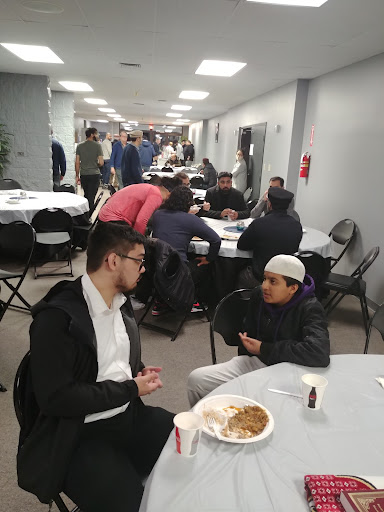
(Photo by Xavier Nazzal)
Towards the end of the event, Ahmad gave Nazzal, Wilson, Kanno, and Ibarra a tour of much of the property, before which Ahmad explained a bit of the history and beliefs of the movement, the prophecies of Mirza Ghulam Ahmad, whose picture hangs in the hall, and gifted them a book called “The Philosophy and Teachings of Islam” by Mirza Ghulam Ahmad.
After this, Nazzal, Wilson, Kanno, Ibarra, Ahmad, and Azam headed to the gymnasium in which Nazzal and Ibarra attempted to shoot hoops, Wilson briefly kicked around a soccer ball, Kanno talked with Ahmad, and Ibarra attempted to pick up a tire.
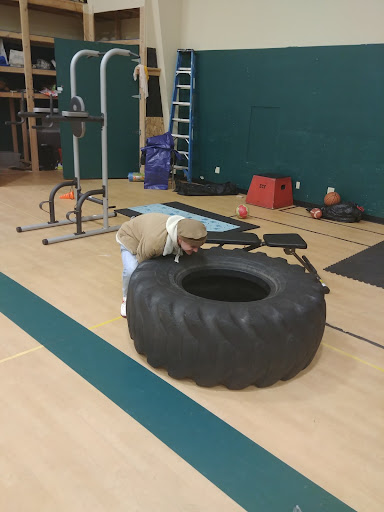
The group, escorted by Ahmad, left the mosque well after 10:00 at night and began the drive back to Tacoma, Washington. Along the way back, they sung praises of the event and Wilson said that he had never felt the presence of God so strongly before, as this was his first time praying communally as a Muslim. Nazzal, Wilson, Kanno, and Rylan Jordan are currently coordinating a planned podcast episode, which they hope to record with Mr. Waqas Malik, Imam Azam Akram, and perhaps some of the other people from the community as well.
The event, which everyone expected to be an incredible experience, was even better than imagined. The hospitality and warmth of the Ahmadi Muslims of the Greater Seattle Area, truly made this a night to remember.
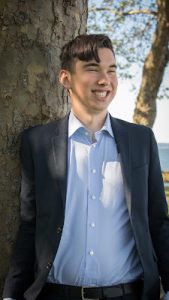
Xavier Nazzal is a senior who serves as the Executive Online Editor for the Lion Journalism 2022 - 2023 school year. Among other things, Nazzal participates...
